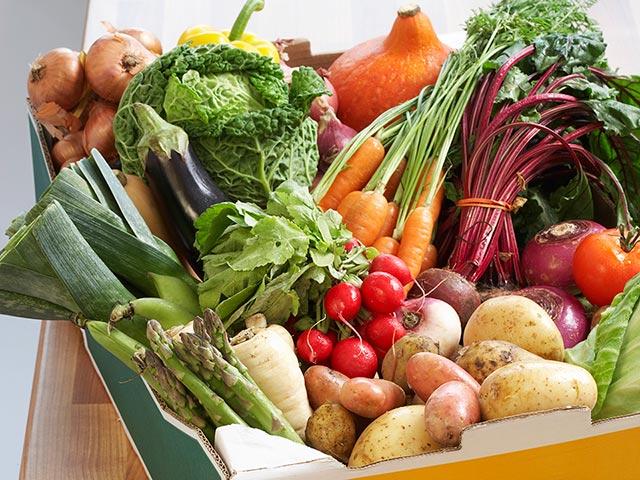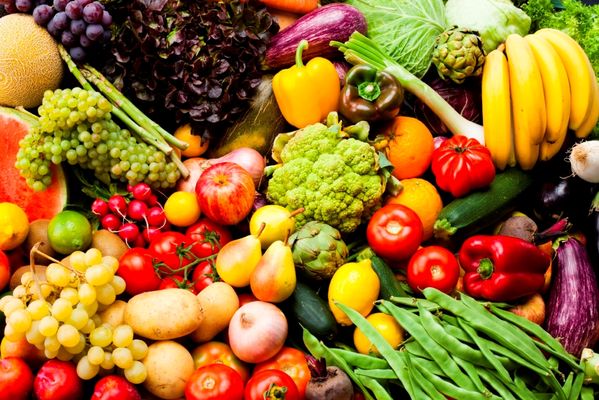Do you dream of a long and healthy life?
So in this case, eat vegetables and fruits regularly!
Of course you already know that! But your problem may be that you don’t have the urge or the opportunities to eat that much!
And that, like a lot of people …
Table of Contents
FRUITS AND VEGETABLES: TOO OFTEN SHUNNED… AMONG YOUNG PEOPLE!
According to ENNS data (National Health Nutrition Study, 2006, carried out on 3,115 adults and 1,615 children representative of the French population), a consumption of less than 3.5 fruits and vegetables per day concerns:
- From 3 to 17 years old, 55 to 60% of children and adolescents,
- From 18 to 55 years old, 35 to 55% of adults (boys eat even less than girls),
- Over 50, only 16 to 18% of seniors!
In short, the older we get, the more we seem to realize that eating fruits and vegetables is important for health and the more we enjoy eating them! This is good news for seniors, but it is a little less so for the youngest! Let us not forget that prevention is important and that the earlier the good eating habits are, the more the body has chances of being in good health over the long term.
WHY ARE THEY SO IMPORTANT …
Know that they contain nutritional elements that you will find very little elsewhere and in particular antioxidants, vitamin B9, vitamin C, fiber.
Antioxidants (polyphenols, vitamins A, C and E, zinc and selenium) allow you to better fight against oxidation phenomena which accelerate the aging of cells. Lack of it chronically increases the risk of cardiovascular disease and even certain cancers.
Vitamin B9 (folate) is a very important vitamin which helps cells to multiply; in particular, it plays a fundamental role from the start of pregnancy during cell divisions during embryogenesis and its deficiency exposes the future baby to serious complications (malformations). That’s why all young women should get enough folate. However, this vitamin is only found in plants!
Vitamin C is a vitamin well known for stimulating the immune system and tone. It is also very antioxidant. It is only found in certain vegetables (raw cabbage, raw peppers, horseradish) and fruits (citrus fruits, kiwi, strawberries, mango, lychees) and is quickly destroyed by cooking. It is very precious for health and the contributions are often insufficient.
Vitamin A (retinol and beta carotene) is also a very antioxidant vitamin that exists in butter and margarines (but the intakes are low) and in orange, green and red vegetables and fruits (in the form of carotene). Hence the need to eat brightly colored vegetables!
The fibers are important to ensure the regularity of the transit. Fruits and vegetables are rich in it since the consumption of 5 fruits and vegetables per day provides about 20g, or 70% of the daily requirement! Without fruits and vegetables, constipation guaranteed!
In short, not eating enough fruits and vegetables increases the risk of fatigue (due to deficiencies), cardiovascular diseases, constipation, poorer immune defenses, and even cancer.

HOW TO INTEGRATE THEM INTO YOUR DAILY LIFE …
First of all, let’s be clear: eating 5 fruits and vegetables a day means eating 5 servings of fruits and vegetables. You can choose from 3 fruits and 2 servings of vegetables or, for example, 3 servings of vegetables and 2 fruits.
For vegetables: one serving is equivalent to a plate of raw vegetables, or a plate of cooked vegetables, or a bowl of soup. The little pinch of parsley doesn’t count!
For fruit: one portion is equivalent to a fresh fruit to bite into (an apple, a pear, a clementine …), a glass of fruit juice or a small bowl of compote. The jam doesn’t count, nor the small pieces of fruit in yoghurt or fruit sorbet.
Let’s start with breakfast: the fruit should ideally be present there, in addition to the milk (milk, yogurt or cottage cheese) and the cereal product (bread, rusks, cereals), in various forms: a chewable fruit or in a compote ( it will however have fewer vitamins), or in juice (its vitamins are well preserved, even in the bottle). In winter, choose citrus fruits (oranges, kiwi, clementines) for their richness in vitamin C.
In the morning , if you are hungry , eat a piece of fruit. Do not hesitate to take some to the office or to arrange them prominently in a fruit basket at home.
For lunch , why not plan a starter of raw vegetables or green salad topped with a small vinaigrette with olive or rapeseed oil. Then continue with meat or fish (or eggs) accompanied by a mixture of starches (rice, pasta, potatoes, pulses) and vegetables (ratatouille, green beans, cabbage, zucchini, spinach, carrots cooked …). Finally, get in the habit of ending your meal with a fresh fruit or fruit salad. It is so good ! This is the opportunity to end your meal on a sweet note, other than with a chocolate cake. One does not exclude the other, but prefer fruits.
In the afternoon, a little hungry? Eat a piece of fruit and… why not some almonds.
In the evening at dinner , eat light (that’s the secret of slimming) around a good dish of vegetables which can be a good hot soup (very popular in winter) or a nice plate of mixed salad, or a starchy foods and vegetables, with why not a little fresh cream or grated Gruyere.
LITTLE PRACTICAL ADVICE …
To best preserve the vitamins and antioxidants in your fruits and vegetables, and knowing that vitamins are sensitive to heat, light and oxidation related to storage, take some precautions:
When you’ve bought them from the Market, don’t delay eating them because vitamin C and folate are susceptible to oxidation from storage. So, don’t keep them for more than 2 to 3 days in the refrigerator.
Wash them and put them in your vegetable drawer because the cold slows down vitamin loss.
Do not leave them lying around at room temperature and in bright light.
Cook them as short as possible; steaming is ideal because the vitamins and minerals remain in the food. If you cook them in water, consume the broth or mix the vegetables with it, because it is enriched with their minerals and vitamins.
When buying soups, vegetable juices and fruit juices, choose opaque packaging over glass bottles, as light destroys some of the vitamins.
YOUR QUESTIONS…
Have canned or frozen vegetables lost their vitamins?
Frozen vegetables have kept almost all their vitamins intact because the cold does not destroy the vitamins. On the other hand, you will lose a little by throwing them in boiling water to cook them in 10 to 15 minutes. Canned vegetables have undergone sterilization (over 140 ° C in a few minutes) and have therefore lost between 20 and 40% of their vitamins. But be aware that you will have about the same level of losses by cooking them yourself at home in boiling water. Steam cooking is the best way to preserve vitamins.
Are all soups the same?
It is undeniable that the best soup is the one you make at home. However, nutritionally, homemade soups or industrial brick soups are equal. In contrast, freeze-dried (powdered) soups no longer have vitamins.
What are the benefits of tomato juice?
We consume less than before and that’s a shame because tomato juice is 3 times richer in lycopene than raw tomatoes. However, lycopene (which is part of the carotenoid family) is a formidable antioxidant! It should therefore be drunk more often, as an aperitif, with a small slice of lemon!
Is there added sugar in bottled fruit juices?
No, the regulations forbid it. Fruit juices only contain the sugars found in fruit, whether they are homemade or bottled. In addition, know that a glass of orange juice provides nearly 70% of your daily need for vitamin C. To be included in the breakfast program!
How to make children love vegetables?
All you have to do is combine them with starchy foods on the plate (mash, pasta, etc.) and add a little light cream, or grated Gruyere. If you put a little ketchup °, you should know that it contains sugar (one piece per tablespoon). So if the child likes to eat it, it is necessary to reduce the consumption of sugar elsewhere. As a general rule, if you put vegetables very frequently on the menus of family meals, the child will eventually get used to their presence. The earlier children are used to eating vegetables, the more they like to eat them later. And yes, children who love soup and spinach, it does exist!
Can you replace milk with soy juice?
Why not, although milk and dairy products are very important to ensure the calcium intake of the day. But if you want to replace milk with soy juice, you have to make sure that it has been fortified with calcium because it contains very little in its natural state. On the other hand, when it is enriched, it contains as much calcium as milk.
Can we be healthy by eating only plants (vegan diet)?
The risk of deficiencies is important because plants do not contain all the nutritional elements that the body needs. The most frequent deficiencies concern vitamin B12, vitamin D, calcium and iron! This is why this mode of feeding should not concern children, adolescents, pregnant and lactating women and the elderly. In vegetarians, the risk of deficiencies is lower because they can eat eggs and dairy products.
In conclusion, eat vegetables and fruits regularly. It is not only delicious but also very easy to prepare and looks great on the plate! You will really feel like you’re doing yourself good, and it’s not just an impression.







![Love & Happiness (Yemaya Y Ochùn) [feat. India] [12](https://m.media-amazon.com/images/I/71zhv0oORkL._AC_UY218_.jpg)



